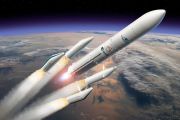
Copernical Team
NASA Webb Measures Size and Surface of Near-Earth Asteroid 2024 YR4
 NASA's James Webb Space Telescope has observed asteroid 2024 YR4, revealing it to be roughly 60 meters in diameter-about the height of a 15-story building-and confirming it poses no significant threat to Earth in 2032 or thereafter.
The study, led by Andy Rivkin of the Johns Hopkins University Applied Physics Laboratory, utilized Webb's Director's Discretionary Time to analyze this unusual
NASA's James Webb Space Telescope has observed asteroid 2024 YR4, revealing it to be roughly 60 meters in diameter-about the height of a 15-story building-and confirming it poses no significant threat to Earth in 2032 or thereafter.
The study, led by Andy Rivkin of the Johns Hopkins University Applied Physics Laboratory, utilized Webb's Director's Discretionary Time to analyze this unusual ISS National Lab unveils startup accelerator to drive innovation in orbit
 The International Space Station (ISS) National Laboratory has introduced the Orbital Edge Accelerator, a new initiative aimed at jumpstarting entrepreneurial activity within the expanding space economy. This program will select six emerging startups to each receive up to $500,000 in funding from investment partners Cook Inlet Region, Inc. (CIRI), E2MC, and Stellar Ventures. In addition to the fi
The International Space Station (ISS) National Laboratory has introduced the Orbital Edge Accelerator, a new initiative aimed at jumpstarting entrepreneurial activity within the expanding space economy. This program will select six emerging startups to each receive up to $500,000 in funding from investment partners Cook Inlet Region, Inc. (CIRI), E2MC, and Stellar Ventures. In addition to the fi Amazon to launch first batch of Starlink-rival satellites
 Amazon is preparing to launch its first full batch of Project Kuiper satellites next week, marking a crucial milestone in the tech giant's bid to compete with Elon Musk's Starlink.
The mission, named Kuiper Atlas 1, will launch 27 satellites using an Atlas V rocket from Cape Canaveral, Florida at 12:00 pm EDT (1600 GMT) on Wednesday, April 9, Amazon said.
The deployment will be carried o
Amazon is preparing to launch its first full batch of Project Kuiper satellites next week, marking a crucial milestone in the tech giant's bid to compete with Elon Musk's Starlink.
The mission, named Kuiper Atlas 1, will launch 27 satellites using an Atlas V rocket from Cape Canaveral, Florida at 12:00 pm EDT (1600 GMT) on Wednesday, April 9, Amazon said.
The deployment will be carried o China highlights major strides in moon research and exploration
 China's lunar exploration initiative has seen consistent advancements across science, technology, engineering, and international partnerships, according to Wu Weiren, chief designer of the Chinese Lunar Exploration Program.
Speaking during the launch of an exhibition at the National Museum of China, Wu emphasized that the country has developed an expansive body of lunar geological and envi
China's lunar exploration initiative has seen consistent advancements across science, technology, engineering, and international partnerships, according to Wu Weiren, chief designer of the Chinese Lunar Exploration Program.
Speaking during the launch of an exhibition at the National Museum of China, Wu emphasized that the country has developed an expansive body of lunar geological and envi Mapping the Earth's crops
 As agricultural research continues to become more entwined with technology, smart farming - a phrase that encompasses research computing tools that help farmers to better address issues like crop disease, drought and sustainability - has quickly become a ubiquitous term in Ag labs across the country. The availability of NCSA resources like Delta for researchers, both nationally and on the Univer
As agricultural research continues to become more entwined with technology, smart farming - a phrase that encompasses research computing tools that help farmers to better address issues like crop disease, drought and sustainability - has quickly become a ubiquitous term in Ag labs across the country. The availability of NCSA resources like Delta for researchers, both nationally and on the Univer ESA's mini weather mission exceeds expectations
 Launched just seven months ago, ESA's Arctic Weather Satellite has quickly demonstrated how the fast-track New Space strategy can accelerate the delivery of missions that offer high-quality atmospheric data crucial for short-term weather forecasting.
This compact prototype, developed on a tight schedule and modest budget, has impressed experts with its ability to generate temperature and h
Launched just seven months ago, ESA's Arctic Weather Satellite has quickly demonstrated how the fast-track New Space strategy can accelerate the delivery of missions that offer high-quality atmospheric data crucial for short-term weather forecasting.
This compact prototype, developed on a tight schedule and modest budget, has impressed experts with its ability to generate temperature and h CesiumAstro joins Taiwan's initiative to build LEO satellite network
 CesiumAstro has secured a key contract with the Taiwan Space Agency (TASA) to supply advanced communications payloads and ground systems for the nation's inaugural low-Earth orbit (LEO) satellite constellation. This agreement supports Taiwan's Beyond 5G (B5G) satellite initiative aimed at creating a sovereign space-based communications infrastructure.
As part of the contract, CesiumAstro w
CesiumAstro has secured a key contract with the Taiwan Space Agency (TASA) to supply advanced communications payloads and ground systems for the nation's inaugural low-Earth orbit (LEO) satellite constellation. This agreement supports Taiwan's Beyond 5G (B5G) satellite initiative aimed at creating a sovereign space-based communications infrastructure.
As part of the contract, CesiumAstro w How hidden lakes threaten Antarctic Ice Sheet stability

For decades, satellites have played a crucial role in our understanding of the remote polar regions. The ongoing loss of Antarctic ice, owing to the climate crisis, is, sadly, no longer surprising. However, satellites do more than just track the accelerating flow of glaciers towards the ocean and measure ice thickness.
New research highlights how ESA’s CryoSat mission has been used to uncover the hidden impact of subglacial lakes – vast reservoirs of water buried deep under the ice – that can suddenly drain into the ocean in dramatic outbursts and affect ice loss.
Webb snaps photographs of Asteroid 2024 YR4
 Image:
Image:
This image shows Webb’s recent observation of the asteroid 2024 YR4 using both its Near-Infrared Camera (NIRCam) and Mid-Infrared Instrument (MIRI). Data from NIRCam shows reflected light, while the MIRI observations show thermal light.
On 8 March 2025, the NASA/ESA/CSA James Webb Space Telescope turned its watchful eye toward asteroid 2024 YR4, which we now know poses no significant threat to Earth in 2032 and beyond.
This is the smallest object targeted by Webb to date, and one of the smallest objects to have its size directly measured.
Observations were taken to study the thermal properties of 2024 YR4,

 Image:
Up for space
Image:
Up for space 






























